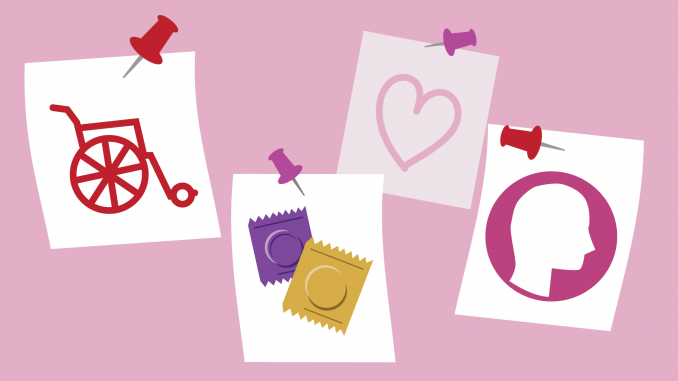
People with disabilities have sex, too, said Vicki Landers, president and CEO of Disability Pride Philadelphia.
“There’s always, in the disability community, this thing where people don’t think that disabled people have sex,” Landers added. “And so we decided that we were going to make it known to everybody that we did.”
For this reason, DPP is hosting an event on Valentine’s Day to provide inclusive sex education for people with physical and intellectual disabilities.
The event, called “Let’s Talk About Disabled Sex,” will feature activities and resources about navigating sex and dating for people with disabilities, Landers said.
The event emphasizes teaching the importance of consent regarding any sexual conduct, Landers added.
“One of the things we like to focus on is consent because there’s a large number of disabled women that get raped every year,” Landers said. “It’s trying to teach them that you can say ‘no,’ and that somebody can’t do it just because they want to.”
Approximately 2 of every 1,000 people with disabilities are raped or sexually assaulted in their lives, as opposed to 0.6 per 1,000 able-bodied people, according to a 2017 report by the U.S. Department of Justice.
Emily Trott, a senior human development and community engagement major and a student worker at Disability Resources and Services, said people with intellectual disabilities are at an especially high risk of sexual violence.
“A lot of folks [with intellectual disabilities] aren’t able to testify against a sexual assault, or even know how to explain what happened,” Trott added. “So, a lot of these instances of sexual assault go unreported and uncharged.”
People with disabilities should be able to have the necessary education to decide the nature of their own sexual encounters, said Maisha Elonai, a volunteer with DPP and the executive assistant at Liberty Resources Inc., a nonprofit organization that promotes independent living for people with disabilities.
“If a person who is doing things that enable us to take care of the basic functions of life, like getting dressed, like toileting, like getting out of bed, they’re there to enable us,” Elonai said. “They are not there to control us, and if they do something, like approach us in a non-consensual manner, we have the right to say ‘no,’ and we have the right to report them.”
The event also emphasizes the importance of communication in relationships for people with disabilities.
“It’s like, ‘When do you [tell them about the disability]? How much do you tell them?’” Landers said. “Because somebody who’s not disabled already has questions in their head of ‘Is this person going to be able to live up to the expectations of any other relationship?’ And the answer is, ‘Yes.’ You just get to be more creative.”
Trott said the lack of sex education for people with disabilities is due to the stereotype that people with disabilities can’t have sex or relationships.
“[People with disabilities] often don’t get any kind of education because people think they’re asexual and they’re not able to have a relationship,” Trott said.
Izzy Kaufman, a board member of DPP and a disability and sexuality educator, said she never saw media representation of people with disabilities in romantic and sexual settings while growing up, which affected the way she thought about sex and relationships.
“I never saw people in romantic movies that looked like me,” Kaufman said. “I never saw people in wheelchairs having that big romantic moment. I never saw it even in pornography. I didn’t see myself in anything, so I kind of just assumed I wouldn’t have sex for a long time.”
Barriers to disability-inclusive sex education include “parental anxiety and fear, the lack of federal funding specifically designed for students with disabilities based on comprehensive sexual health education, lack of teacher education programs [and] lack of teacher knowledge and confidence resulting in concern, anxiety, and fear,” according to a 2017 study in the American Journal of Sexuality Education.
Kaufman said she never received sex education that was inclusive of her disability in school.
“I was angry about it, and that’s why I became a sex educator,” Kaufman said. “Because I thought, ‘My community is not getting the right education, so I might as well be the one to deliver it.’”
It’s important for able-bodied individuals and people with disabilities to realize that they can learn from each other and alongside each other, Elonai said.
“People with disabilities are people,” Elonai added. “And for both the able-bodied community and for the community of people with disabilities, we should all be aware of the fact that love is love, pleasure is pleasure. We’re all coming as we are to it, and we can all learn from each other.”
“Let’s Talk About Disabled Sex” event is on Feb. 14 from 10:00 a.m. to 4:00 p.m. in the Wade Blank Conference Room at Liberty Resources, Inc., at 112 N. 8th St.


Be the first to comment